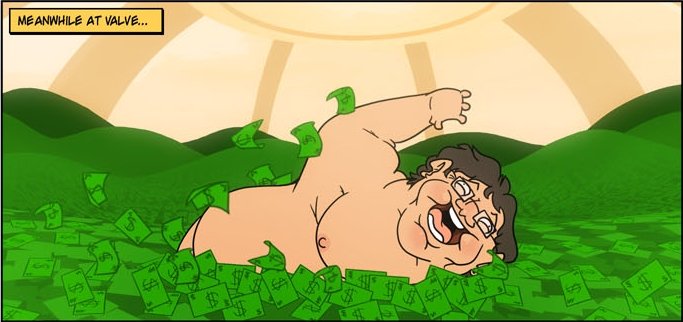You're just ducking any responsibility for carrying the discussion forward here. I've already done my share offering arguments and rebuttals to the pro-DRM (???) arguments, most of which were terrible strawmen of DRM-skeptical or anti-DRM positions, or were lamely rendered efforts to claim some special benefits from DRM - which all fall over the moment somebody looks at them. I've also made my own position pretty clear, so you could chew that over instead of saying that we need to go back to wrestle with old arguments that didn't hold up the first time they were offered.Cagar wrote:This at least once again confirmed how impossible this whole subject is to discuss.Ed Oscuro wrote: At best people aren't thinking about these things. At worst, they're being utterly selfish (while still being confused about what benefits they get - none, really) or dismissive of the culture they are in. What's the point of paying for something and supporting it as an enterprise if you think that it's not worth saving for the future?
Skeptics, please consider taking the earplugs off for a second and try thinking inside the box for once.
Perhaps I can make a more succinct version of the arguments: There's no reliable conclusion from survey data in support of DRM from the standpoint of publishers; at the very least, there are a number of cases where DRM-free products generated positive feelings or otherwise created value for the users. Even Microsoft has said it: If somebody is going to pirate a product, they'd rather it be theirs.
The only tangible benefit for publishers of a marketplace dominated by DRM techniques would be that effort to squash second-channel sales and also remove peoples' ability to use media by attrition. Actually, I don't think there's any impact on publishers' ability to generate multigenerational sales - just look at Good Old Games. Nothing there stops publishers from releasing on multiple platforms or future platforms, unless you think that a publisher's competition with already-sold product is a crying shame (it isn't).
That one can give away a game disc, but not one's copy of a game file, is a fundamental shift in view that probably has no precedent in the law - it could be argued this is also too much of a shift in favor of publishers and away from users. That's a step further than the simple DRM skeptical position being taken here by most users (which is simply asking for the right to make up local backups, which is quite different from asking for a renewal of the traditional right to sell media on). Outside the sphere of DRM, distributors have gotten a big enough victory via digital distribution, which makes clear the first sale doctrine only applied in circumstances where there was a tangible media format to sell, which was however separate from intellectual property rights. Yet in many ways things are fundamentally the same: Now the media is, in fact, the actual digital file; selling on your one copy of that (and deleting any backup) does not hamper an author's intellectual property rights, any more than their inability to reach into your house and erase games on disc that you already own.

